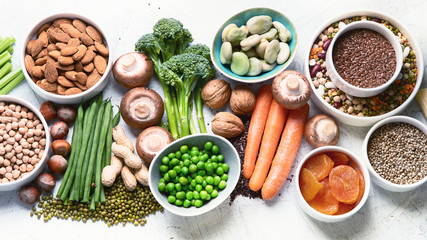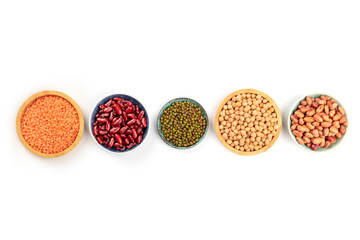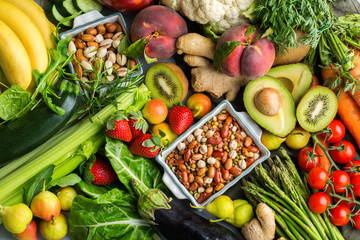No Products in the Cart


Truth is…
Protein is always the biggest concern when it comes to a plant-based diet but there is no risk of protein deficiency on a properly planned and balanced diet.
Fiber has been found to promote feelings of satiety. Meaning that it helps to prevent overeating and food cravings. Fiber also helps support weight loss and maintain normal blood sugar and insulin levels.
Plant Protein
All plants contain amino acids, and some have more than others. All 20 amino acids are found in various plant sources: legumes, nuts, seeds, soy and grains.
Nuts: Almonds & walnuts are a good source of protein and contain fiber and EFA’s and are rich in Vitamin E, B2, B7 (biotin), iron, and magnesium.
Seeds: Sesame and pumpkin seeds are packed with fiber, protein, EFA’s, niacin, calcium, iron, magnesium, and vitamins E, B1, B5, and B6.
Beans and lentils: High in fiber and protein content, micronutrients: folate, calcium, iron, magnesium, and vitamins K, B1, and B2.
Whole grains: Great source of protein, micronutrients with rich sources of vitamin B1, calcium, iron, and magnesium.

❞ The more and varied the fiber you consume from various plant sources, the broader variety of healthy microbes you will have.

Fiber is a health must- have.
A huge benefit of a plant-based diet is its fiber content.
Ideally, aim for 80 grams of fiber a day, which isn't too difficult when you focus on eating plants.
Fiber is important for gut bacteria and helps you stay regulated. With respect to the sex hormones, increased fiber intake has been associated with overcoming estrogen dominance, improving premenstrual syndrome (PMS), and reducing the risk of estrogen- dependent cancers, among others. Fiber has also been found to reduce cholesterol and triglycerides and lower glucose levels.
Fruits and vegetables that are high in fiber include:
Asparagus: fiber, vitamin K, folate, B1
Beets: fiber, iron, B6, potassium, vitamin, magnesium, iron, B6, betacyanin's, betaxanthins
Broccoli: fiber, vitamin C, vitamin E, folate
Cherries: fiber, vitamin C, beta- carotene, flavonoids, phosphorus, potassium
Coconut: fiber, electrolytes, monolaurin, manganese, potassium, phosphorus
Cranberry: fiber, vitamin C, vitamin A, anthocyanins, polyphenols
Grapefruit: fiber, vitamin C, vitamin A, potassium, calcium, magnesium, folate, B1 and B6, lycopene (in red/pink)
Greens (spinach, lettuce, kale, etc): fiber, vitamin A, vitamin C, vitamin E, vitamin F, vitamin K, B6, folate, calcium, iron, magnesium
Mango: fiber, vitamin c, vitamin E, vitamin K, beta- carotene, folate, B1, B2, B3, B6, calcium, potassium, iron, lycopene, polyphenols
Oranges: fiber, vitamin C, folate, B1 and B5, copper, potassium, calcium
The Colon and Fiber

In order for your body to absorb all of these nutrients, your colon needs to be healthy. From fiber, the gut bacteria produce short- chain fatty acids, which are an energy source for the cells lining the colon. The colon works most efficiently with a diet full of whole grains and raw fruits and vegetables.
When you eat fruits and vegetables, you literally feed your good gut bacteria. You also get all the micronutrients and antioxidants you need, because they are attached to the fiber and are released as the fiber travels through the GI tracts. Highly processed and refined foods that are common in today's diets lack active enzymes, amino acids, vitamins, minerals, healthy fats, and fiber to properly nourish and exercise the colon for good health. Healthful natural foods nourish the very cells of the colon.